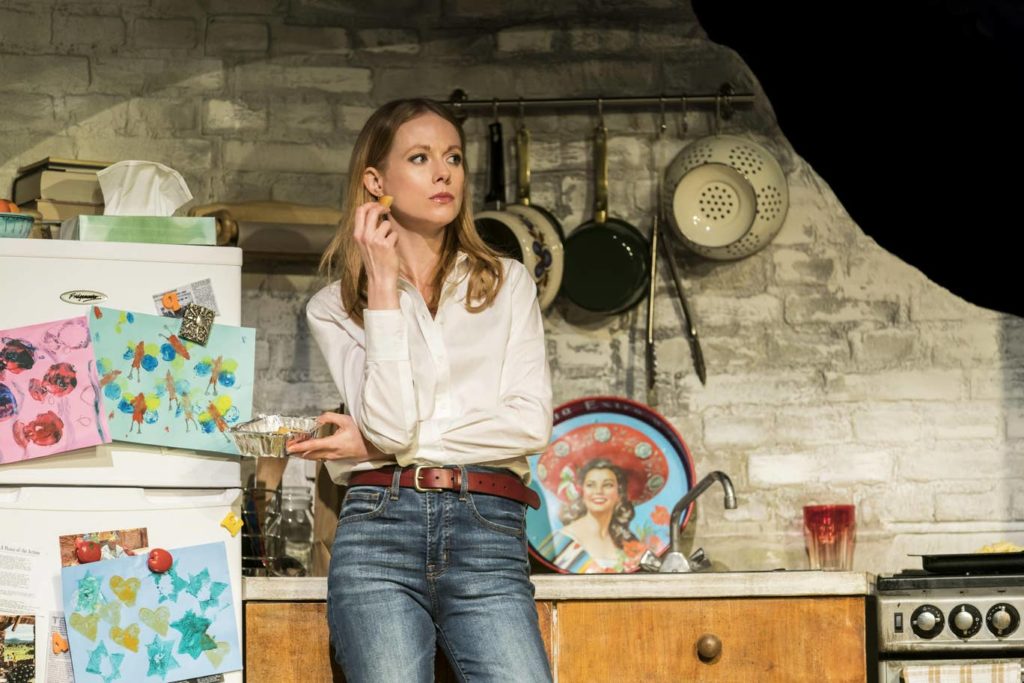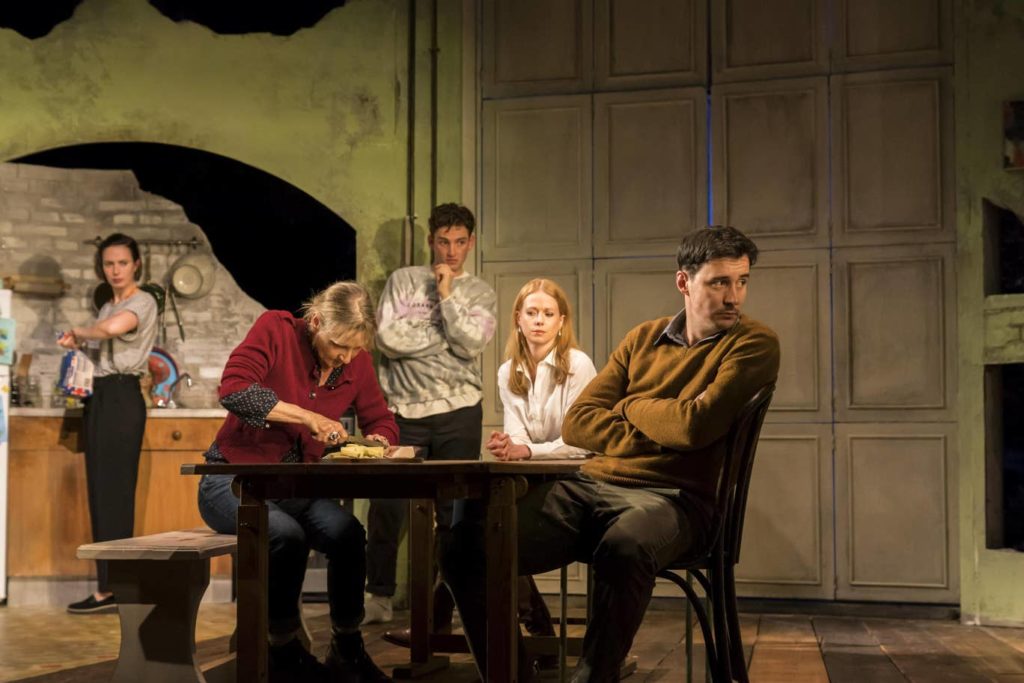
I love food, but I love cooking even more. The shopping and chopping, the stirring and serving. Cooking for other people is a pleasure, a game, an expression of care. At heart, I’m a caterer.
So it was remarkably upsetting to see food repeatedly announced yet never enjoyed in Jack Thorne’s new play the end of history… at the Royal Court. Each of the three acts – set a decade apart, from 1997 to 2017 – takes place around the kitchen table, each at a meal that is destined to remain uneaten. The inedible curry simmering rather less violently than the family argument alongside; the Chinese takeaway that remains huddled in its foil cartons while a crisis develops; the lasagne left to cremate in the oven.
There’s a running joke in the play about Sal (an incandescent Lesley Sharp) and her terrible cooking. Her adult children deliver many criticisms of her parenting, but, brilliantly, this isn’t one of them. Sal isn’t slattern-shamed, nor is her lack of interest in catering used against her (except for an affectionate family giggle).
When I interviewed Thorne and his director, John Tiffany, while the play was still in rehearsal, they told me that early drafts had served up the scran, until Tiffany suggested it should never reach the table. ‘I was like: you can either direct the play and text,’ Tiffany said, ‘or you could spend four weeks working out how to cook and serve food. Much as I love Nigella Lawson, that ain’t my forte.’
Countless family dramas crouch around the dinner table – choose between name-day cake with the Three Sisters, the curdled celebration of Festen or Titus Andronicus, where family is on the menu as well as the seating plan. That the food isn’t eaten in the end… (except for a nibble sneaked by the rancidly posh in-law Harriet [Zoe Boyle, pictured top] who, despite honking on about her MSG intolerance, prises open a takeaway carton while everyone else deals with an attempted suicide) suggests how singular a play it is. It’s a family drama, sure: but one that marks the energy of the family bond, yet also insists that it isn’t the only – certainly not the prime – value on which to centre a life.

As someone lectured me recently on ‘family values’, I wondered what they meant by the term. To them, it meant the tight, exclusive centrality of the nuclear unit – but there are other, more capacious meanings. For example, the values you learn from your family and apply to the world. That has perhaps been an idea running through previous Thorne/Tiffany collaborations like Let the Right One In and Harry Potter and the Cursed Child. It has certainly been Sal’s project with her husband David (David Morrissey): to prepare their three children not for worldly success or personal contentment, but to live with sharpened set of principles to take out into the world. To make a difference, not to themselves or their immediate loved ones, but to society at large.
It’s an audaciously idealistic project, and it more than skirts ridicule. It’s not how most of us choose to live, and when I read the script I shared the siblings’ exasperation at their impossible parents. Parents who jibe at corporate careers or actively counter the social inequalities perpetuated by inherited wealth. They madden their kids, they might madden you.
But seeing Tiffany’s warm, kinetic production, I found myself swept up in Sal’s ferociously big heart. The absolute love she feels for her brood – especially Polly (Kate O’Flynn), her spiky and intransigent daughter – was never in doubt, but nor was her commitment beyond the home presented as a thing to scoff at. Sharp gives a huge performance – revved-up chat, eyes popping with curiosity, a florid range of gesture (flourish, point, claw the air) that achieves flamenco bravura. Her body, especially in the first act, thrums with vitality. To love like Sal does doesn’t feel selfish. It feels thrilling.
If I were a character in the end… I know too well what I’d be doing. Spooning sweet-and-sour from the cartons and fretting about condiments. The idea that you might grate the cheddar for cheese on toast (no mustard? Just a thought) but not pop it under the grill would cause me palpable, twitchy distress. I’d be wanting everyone to shut up and dig in while it’s hot, I know it.
So to be reminded that there’s more, much more to life was salutary. Sal ‘never learnt to cook,’ says David, ‘she never saw the point. Food was just what you ate in order to fuel your day.’ There’s a lot of superb, impassioned and witty talk in the play – Thorne gives everyone the gift of the gab and makes space for them to use it – but, especially in the movement-led transitions between the scenes, when looks caress and music bonds, it’s also an achingly tender evening. Towards the end, the walls of Grace Smart’s apparently immutable kitchen melt away to reveal an open, sunlit world beyond. Values aren’t confined in the domestic pressure cooker, but released. It’s a heart-swelling image – one that feeds the soul.
Follow David on Twitter: @mrdavidjays

Leave a Reply